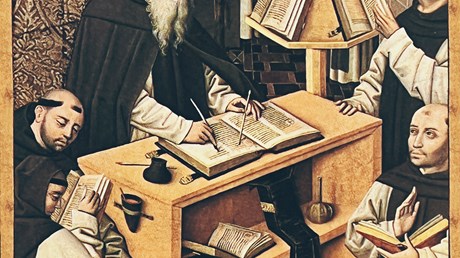Evangelicals should humbly learn from all Christian tradition—yet many are ignorant or suspicious of pre-Protestant theology.

Recently, one of my students asked me how long I’ve been teaching theology. “Ten years,” I said. And as I walked back to my office and sat down at my desk, a question hovered in my head: What have I left my students with after a decade?
In my self-centeredness, I had assumed I was the one bestowing the gift of knowledge to my students. But in truth, one of the best things I have done is send my students into modern ministry’s stormy seas with time-tested wisdom from an experienced crew from church history.
The longer I teach, the more I resonate with C. S. Lewis’s admonition, “The task of the modern educator is not to cut down jungles but to irrigate deserts.” And yet there remains notable deserts in the world of seminary education, particularly when it comes to incorporating large swaths of Christianity’s Great Tradition.
Years ago, as a PhD theology student at a Protestant seminary, I was handed a list of required reading. Out of 128 books, only three of them (!) were by premodern authors (written from the first century to the 15th century).
Even when I crossed into history with my degree, seminars skipped from the church fathers to the Reformers, only to progress into American history. And since half—yes, half—of church history lies in the Middle Ages, this gap in my education felt like a Grand Canyon. So, I petitioned the school to invent my own independent study of medieval theology and history.
Has anything changed today?
Christopher Cleveland chronicles how evangelical seminaries sought to replace liberal with conservative theologians, and in the process—due to either neglect or avoidance—“a generation of evangelical scholars arose who had no ...
from Christianity Today Magazine
Umn ministry


.gif)

.gif)
.gif)
